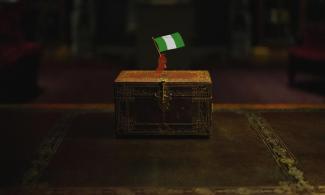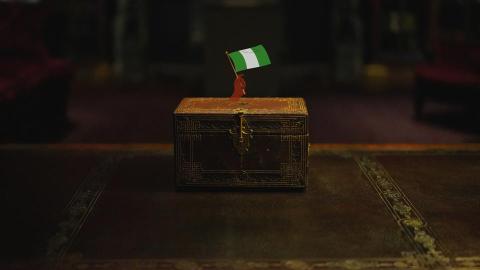
This information must be given to the public, particularly as the individual in question was indicted in the past for committed federal crimes.
In my recent but brief correspondence with David Hundeyin, I asked him why he thought his groundbreaking report was useful for the country. He responded that the report is of crucial value because it shows that “there is clear and unambiguous support for Boko Haram and Islamic terrorism from the very top, i.e., the President and his cabinet.” He observed further that even as our brothers and sisters commit their lives to fight Boko Haram, the conflict of loyalty among those at the very top only suggests that “Nigeria has a big, big problem on its hands.” To these responses, I pondered: if there is the slightest connection between those leading Nigeria and Boko Haram terrorists, who should be regarded as real enemies of the state: Boko Haram? Or those sponsoring Boko Haram and concurrently leading the war against terrorism?

Why is the Presidency Silent on Yakubu Katsina?
Hundeyin has created a direct line between those in the President’s circle and Boko Haram, which the presidency cannot deny exists. But why has the presidency yet to address Nigerians on this alleged linkage? It cannot be the case that the presidency and the Department of State Services (DSS) do not know who Yakubu Musa Katsina is and what he is alleged to have done. As Hundeyin emphasized, Yakubu Katsina has always been “known to the Nigerian security forces as the leader of a terror network trying to set up terror cells in [the state of] Katsina and Kano as far back as 2002.”
For God’s sake, it’s been almost a week since Hundeyin’s report was published, but the DSS has yet to tell Nigerians why Yakubu Katsina was arrested in 2002 and 2004. The DSS must inform the public of the circumstances under which Katsina was released. More so, in light of Hundeyin’s report, has Yakubu Katsina had any links to terrorist cells in the north or the Taliban and Al-Qaeda affiliated Groupe Salafiste pour la Prédication et le Combat after 2004? This information must be given to the public, particularly as the individual in question was indicted in the past for committed federal crimes.
Also, why has the presidency refused to respond to the alleged connection between the Izala Society and Boko Haram on the one hand, and Isa Pantami (communications minister) and Sheik Ahmad Gumi (de facto negotiator between bandits and the governments) on the other?
There have always been suspicions among the public about Pantami’s support for extremists going by his rhetoric on the role of Islamic values in a plural society like Nigeria. Eyebrows have equally been raised on the apparent apologetic attitude of Gumi to murderous bandits. But these speculations and suspicions have been further strengthened by Hundeyin. We now know that both Pantami and Gumi are close allies of Yakubu Katsina and Alhaji Haruna Shahru, two individuals with alleged ties to Boko Haram and the President.
In effect, a question that begs an answer from the presidency is: were Pantami and Gumi not subjected to high-level security checks before working with the presidency? Equally, were these connections with Boko Haram found but buried by the DSS, giving the 2002 and 2004 arrests of Katsina by the DSS? In the same vein, did the President ever know about these connections? I guess we may never know for sure if those at the “very top” knew what was going on but chose to ignore it. Whichever way, this is the kind of attitude that many in the country’s south believe indicates that there is indeed an Islamic-north hegemony against the ‘rest of us’ going on in Abuja.
A Betrayal of Public Trust
One may wonder why groups within the Igbo and the Yoruba ethnic divisions have intensified calls for secession at such levels only matched by the Biafra agitation in terms of public appeal. But the answer is not far-fetched: the ‘rest of us’ believe that there is an ongoing plot to Islamize Nigeria under Hausa-Fulani domination. Suppose the Igbo and the Yoruba public see individuals like Yakubu Katsina and Aminu Daurawa as sponsors of Boko Haram, and the President would instead welcome them to Aso Rock and pose for photos, why then would the President wonder how the Igbo and the Yoruba would not buy into his rulership?
For sure, the President is in no way doing his image any favor. But more importantly, what does this kind of attitude—a betrayal of trust—stand to do to the rest of the country that is yet to call for secessions like the Igbo and the Yoruba? As Hundeyin lamented, perhaps Buhari “knows all these already, and he has chosen a side”: perhaps, in this case, the side of the Izala Society and those who are alleged to be sponsoring terrorists against the Nigerian state.
We all must be Hundeyin
By looking at the federal government’s attitude to criticism, one can tell that it has zero tolerance for opposing opinions. As such, going toe-to-toe with that kind of government can be incredibly dangerous. But Hundeyin’s courage, by his excellent reporting, is a reminder that the public cannot stop to ask questions. The moment the government is allowed to rule without pushback marks the true end of our democracy. The oligarchic and ethnocratic nature of the Nigerian democracy under the Buhari leadership is an existential threat to Nigeria itself. If the reader of this article is still interested in Nigeria’s continuity, my advice for such a reader would be to find ways of pressuring the government to do better and be accountable to the country, as Hundeyin has done. Tyranny blossoms the brightest when the public chooses to remain silent. In this case, silence is already deadly.
Ibrahim B. Anoba (Bàbátúndé Anọ́ba) is a Nigerian journalist and columnist for Sahara Reporters. He is also an Africa fellow at Atlas Network. He tweets via @Ibrahim_Anoba.